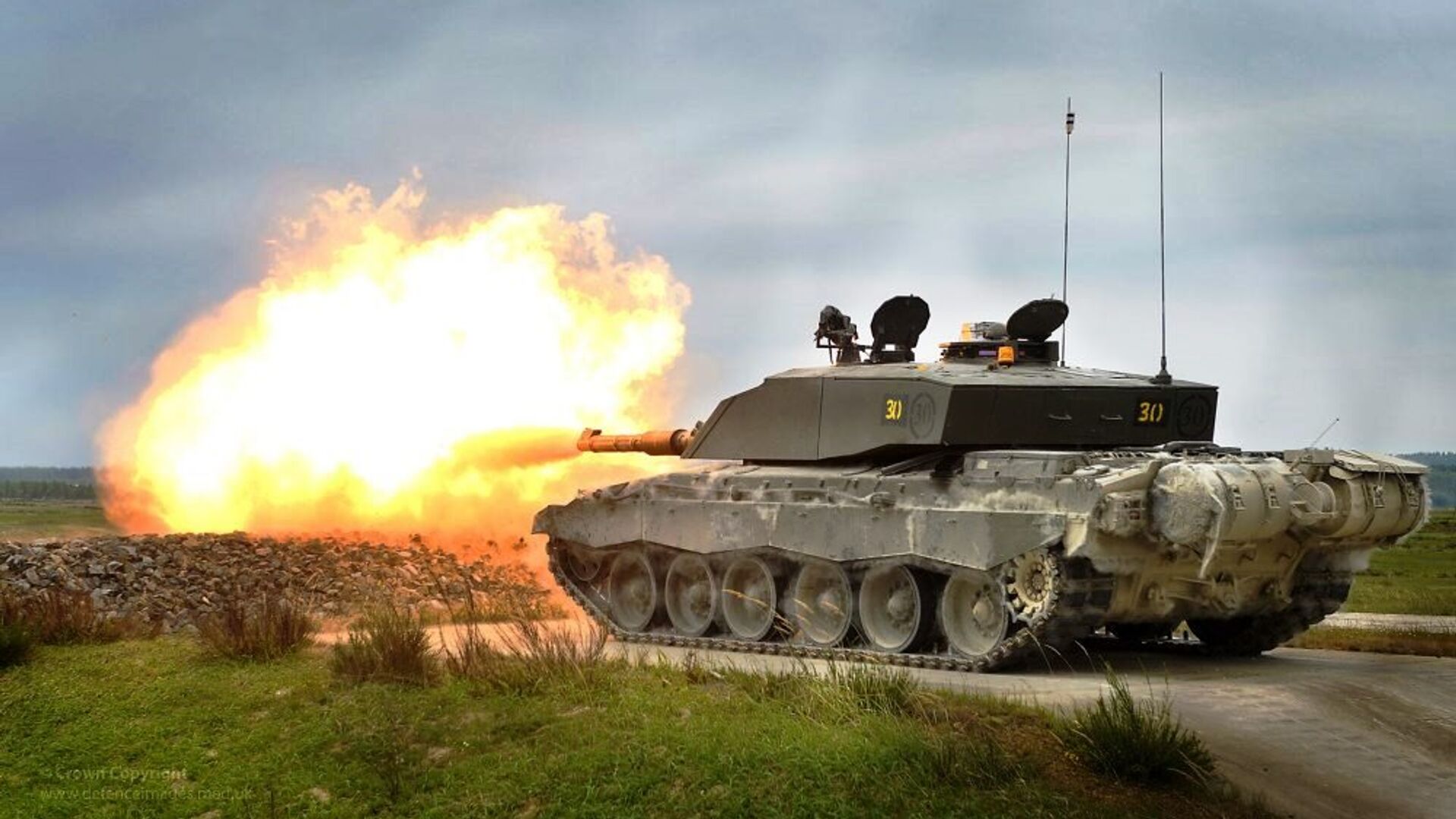https://en.sputniknews.africa/20230321/1058472938.html
London to Hand Depleted Uranium Ammo to Kiev With Challenger 2 Tanks, Says Junior Defense Minister
London to Hand Depleted Uranium Ammo to Kiev With Challenger 2 Tanks, Says Junior Defense Minister
Sputnik Africa
The UK has pledged 14 of its 227 Challenger 2 main battle tanks, along with a plethora of other heavy arms, to Ukraine — which Russia has warned will only prolong the conflict there.
2023-03-21T14:16+0100
2023-03-21T14:16+0100
2023-04-12T11:19+0200
russia's special operation in ukraine
ukraine
united kingdom (uk)
ben wallace
rishi sunak
united states (us)
https://cdn1.img.sputniknews.africa/img/07e7/04/0a/1058473115_0:11:1001:574_1920x0_80_0_0_1a15192fb248a8a455dee0c553d2e5ed.jpg
The British government will give Ukraine radioactive depleted uranium ammunition for the tanks it has promised the Kiev regime.Prime Minister Rishi Sunak's government has already pledged 14 of its Challenger 2 main battle tanks (MBTs) to Volodymyr Zelensky's regime in Kiev. The tanks have been out of production for over 20 years and only 227 remain in service with the British army.Defence Secretary Ben Wallace has also announced that three batteries of the army's AS90 155mm self-propelled howitzers will also be sent, adding up to at least 24 vehicles. The Ministry of Defence has reportedly placed an order for Archer wheeled motorised howitzers from BAE Systems' Swedish subsidiary Bofors after it emerged that the donated vehicles represent most of the army's functional artillery.Russia has warned NATO members that arming Ukraine will only prolong the conflict and lead to more bloodshed, without changing the outcome.DU is used in the high-velocity, dart-like projectiles due to its very high density — two-thirds heavier per cubic centimetre than lead — which increases armour penetration, as well as its pyrophoric property of igniting on impact.DU ammunition was heavily used by US forces and their allies in the 1991 Gulf War and the 2003 invasion of Iraq. Doctors have said the radioactive material — a by-product of spent nuclear fuel — left strewn around the country has caused horrific birth defects and increased rates of cancer.A study published by the US federal National Institutes of Health in 2021 concluded that the evidence gathered "suggests possible associations between exposure to depleted uranium and adverse health outcomes among the Iraqi population."Serbian citizens have also sued NATO over its use of around 15 tonnes of DU munitions in its 1999 war on the Balkan republic in support of Kosovar separatist militants, but the US-led alliance has claimed it has legal immunity from litigation.
ukraine
united kingdom (uk)
united states (us)
Sputnik Africa
feedback@sputniknews.com
+74956456601
MIA „Rossiya Segodnya“
2023
Sputnik Africa
feedback@sputniknews.com
+74956456601
MIA „Rossiya Segodnya“
News
en_EN
Sputnik Africa
feedback@sputniknews.com
+74956456601
MIA „Rossiya Segodnya“
Sputnik Africa
feedback@sputniknews.com
+74956456601
MIA „Rossiya Segodnya“
london vows to deliver depleted uranium ammo, the ukraine crisis
london vows to deliver depleted uranium ammo, the ukraine crisis
London to Hand Depleted Uranium Ammo to Kiev With Challenger 2 Tanks, Says Junior Defense Minister
14:16 21.03.2023 (Updated: 11:19 12.04.2023) The UK has pledged 14 of its 227 Challenger 2 main battle tanks, along with a plethora of other heavy arms, to Ukraine — which Russia has warned will only prolong the conflict there.
The British government will give Ukraine radioactive depleted uranium ammunition for the tanks it has promised the Kiev regime.
"Alongside our granting of a squadron of Challenger 2 main battle tanks to Ukraine, we will be providing ammunition including armour piercing rounds which contain depleted uranium," junior Defence Minister Annabel Goldie told Parliament on Tuesday in response to a question from Lord Raymond Hylton. "Such rounds are highly effective in defeating modern tanks and armoured vehicles."
Prime Minister Rishi Sunak's government has already pledged 14 of its
Challenger 2 main battle tanks (MBTs) to Volodymyr Zelensky's regime in Kiev. The tanks have been out of production for over 20 years and only 227 remain in service with the British army.
Defence Secretary Ben Wallace has also announced that three batteries of the army's AS90 155mm self-propelled howitzers will also be sent, adding up to at least 24 vehicles. The Ministry of Defence has reportedly placed an order for Archer wheeled motorised howitzers from BAE Systems' Swedish subsidiary Bofors after it emerged that the donated vehicles represent most of the army's functional artillery.
Russia has warned NATO members that arming Ukraine will only prolong the conflict and lead to more bloodshed, without changing the outcome.
DU is used in the high-velocity, dart-like projectiles due to its very high density — two-thirds heavier per cubic centimetre than lead — which increases armour penetration, as well as its pyrophoric property of igniting on impact.
DU ammunition was heavily used by US forces and their allies in the 1991 Gulf War and the
2003 invasion of Iraq. Doctors have said the radioactive material — a by-product of spent nuclear fuel — left strewn around the country has caused horrific birth defects and increased rates of cancer.
A
study published by the US federal National Institutes of Health in 2021 concluded that the evidence gathered "suggests possible associations between exposure to depleted uranium and adverse health outcomes among the Iraqi population."
Serbian citizens have also
sued NATO over its use of around 15 tonnes of DU munitions in its 1999 war on the Balkan republic in support of Kosovar separatist militants, but the US-led alliance has claimed it has legal immunity from litigation.


